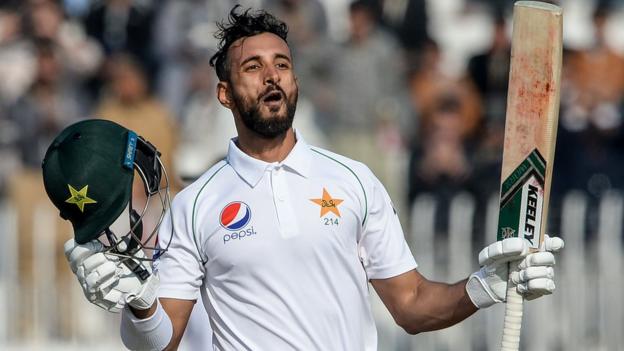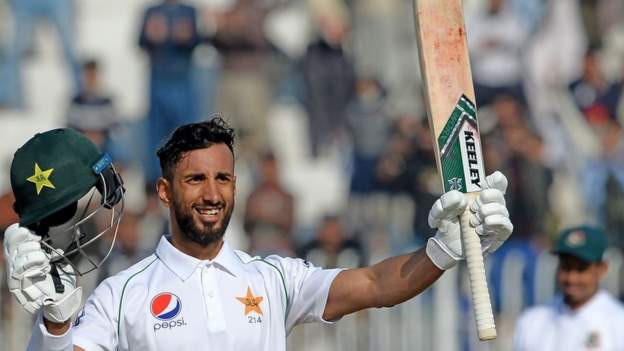| Date: 14-18 December Time: 02:20 GMT Venue: Perth Stadium |
| Coverage: Live radio commentary on BBC Sounds, BBC Radio 5 Sports Extra and the BBC Sport website, plus regular reports and features |
Ahsan Iftikhar Nagi is formerly the media manager for the Pakistan men’s national team and is currently working for Multan Sultans. Previously he wrote for publications including Dawn and Cricbuzz. Here he looks at the challenges facing Pakistan’s new Test captain, Shan Masood.
Shan Masood’s appointment as the new Pakistan Test captain ended weeks of commotion.
It was certainly not how a player wants to be handed the reins: the build-up laced with drama that only the Pakistan Cricket Board (PCB) is capable of scripting.
It all began with a press release that threw incumbent captain Babar Azam and Inzamam-ul-Haq, the then chief selector, under the bus after a historic World Cup defeat by Afghanistan in Chennai.
Then came 15 November – the day the PCB put out three press releases in less than an hour to announce Azam had stepped down voluntarily, Shan Masood and Shaheen Afridi were the new Test and T20 captains, and Mohammad Hafeez had replaced Mickey Arthur as team director.
Throughout that period there were recriminations for other PCB officials too, following Pakistan’s poor showing at the World Cup in India.
A three-Test tour of Australia is next for Pakistan, and all with a new leader.
Popular Masood a ‘very good tactician’

Masood is widely regarded as one of the most astute cricketers in the current Pakistan set-up.
His fitness levels and work ethic are exemplary, and he is considered one of the nicest people to be around.
However, despite making his Test debut a little over a decade ago, Masood has struggled to become a permanent fixture in the Test side – only doing so last winter in the series against England.
His 30 Tests to date have seen him accumulate 1,597 runs at a meagre average of 28.51.
Those numbers do not make for an impressive reading in a country where the captain remains under intense scrutiny for his own returns rather than the team results.
Babar, despite not being known as an astute captain, was handed the reins of Pakistan’s limited-overs sides in 2019 and then the Test side in 2020 based on his prolific batting.
There was also hope that the investment in the young cricketer, as Babar was in mid-20s, would pay off and Pakistan would finally have a long-term captain.
Now, three years on, Pakistan have a captain who is almost a decade older than his predecessor at the time of his appointment.
Such was the swift promotion, Masood has been elevated to Band B in the PCB’s central contract list, having previously been in the bottom bracket (Band D).
He, however, comes to the job with noteworthy experience. Masood has captained in 33 first-class matches and won 17 of them. Only five of the remaining 16 have resulted in defeats.
“I believe there are two roles for a captain,” says Mickey Arthur, who as head of cricket at Derbyshire signed Masood last summer.
“One is making the decisions on the field and the other is off the field, which includes giving total clarity to the players – in terms of the roles, what you want, and working hand in hand with the coach to make sure the environment is structured.
“I really think Masood is capable of leading Pakistan’s Test side. He understands cricket and he will be a very, very good tactician.”
Why Masood bucks the trend
Masood began his first-class captaincy career in 2015 at the United Bank Limited. That decision was based on developing the batter’s leadership abilities and saw him work in tandem with Pakistan Test legend Younis Khan.
“He [Masood] was a role model for the team,” explains Nadeem Khan, who then served as head of cricket at UBL and is the current PCB director of domestic cricket and academies.
“He used to look after players around him and had very good relationships with his colleagues. He put the interests of others before his.”
The Pakistan dressing room, however, is accustomed to being led by its best batter.
Masood’s last Test century was way back in August 2020 and he has been averaging a paltry 15.75 in 16 innings since.
| Name (years captained) | Test batting average |
| Misbah-ul-Haq (2010-2017) | 46.62 |
| Azhar Ali (2016-2020) | 42.26 |
| Sarfaraz Ahmed (2017-2019) | 38.27 |
| Babar Azam (2020-2023) | 47.74 |
| Shan Masood (2023-) | 28.51 |
| * minimum nine Tests |
Australia, however, can be a good starting point.
On Pakistan’s last Test tour of Australia in 2019-20, which comprised two matches, Masood was one of the five batters to cross the 50-run mark in one of the four innings and his average of 39 down under is the best behind Mohammad Rizwan’s 44.25 among the current squad.
Since his return to the playing XI, Masood has adapted to a more attacking style of batting.
He became the poster boy of the previous Pakistan team management’s philosophy of scoring at higher rates that they named ‘The Pakistan Way’.
In the last five Tests, dating back to December 2022, Masood’s scoring rate has shot up by almost 30 to 77.93, compared to his career strike-rate of 48.03.
There is not the burden of expectation either.
Only three Pakistan captains have won a Test in Australia and they are currently on a 14-match losing streak that dates back to 1999.
Masood is out to break that drought. Now the post-World Cup commotion and upheaval is over, of course.





















